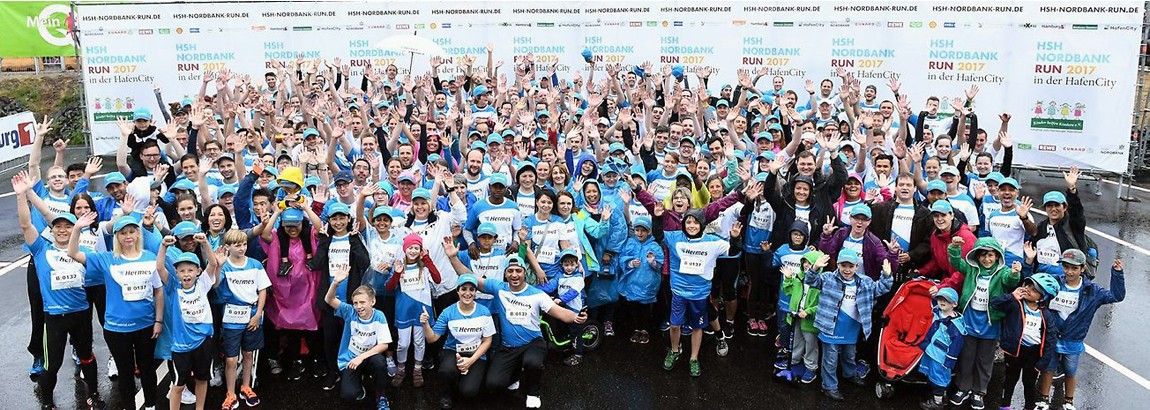Hermes' social engagement: Actively involved for a good cause
Hermes was founded in 1972, at a time in which the social market economy in Germany was flourishing. The economic situation changed drastically after the fall of the Berlin Wall in 1989 - competition has become noticeably much more global. However, as part of the Otto Group, Hermes’ belief that markets and morals belong together and that social peace is only possible in combination with social security is as strong as ever. Based on this belief, the Hermes companies work to provide reliable support to projects that have a local focus – for example, near the company’s headquarters in Hamburg - as well as global one – near Hermes’ various locations. A selection:
Collaboration with the Plan foundation
Hermes has been working with Plan, the international children’s aid organisation that works in developing countries in Africa, Asia and Latin America, for many years. The collaboration was intensified in 2014. Since then, the two organisations have cooperated on the expansion and maintenance of a school in Kenya, which is being supported with a grant of 100,000 Euros over two years. Attending school in Kenya has been free since 2003 and the demand for slots in schools has been growing constantly as a result. However, the existing infrastructure cannot cope with this demand on its own.
Ein Herz für Kinder
Hermes has supported the association Ein Herz für Kinder (A heart for children) since 2011. But Christmas is a special time for this collaboration: For every private parcel sent through Hermes, two cents go to the campaign Bild hilft ein Herz für Kinder (Bild helps a heart for children). Germany is the focus of this campaign, because there also are children in need in Germany. Soup kitchens, kindergartens, schools, education and supervision programs, and clinics are supported. The association also provides individual assistance to children in emergency situations. In 2012, 2013 and 2014, this effort raised 140,000 Euros each year.
German Cancer Aid
From 2013 till end of season 2017, Hermes had been an official partner of the Bundesliga. This partnership was a highly visible one: Hermes was visible in every game – whether first or second league – on the Hermes-branded ball pedestal, on the referee boards and especially on every player shirt. On the 40th anniversary of the founding of German Cancer Aid, Hermes turned over this important media and advertising tool to German Cancer Aid, the organisation founded in 1974 by Dr. Mildred Scheel that fights cancer in all its forms. Fritz Pleitgen, president of German Cancer Aid, characterised this gesture as “incredibly important”: “Our presence on a entire Bundesliga game day, which is followed by millions of people in the stadiums and on television, is a very valuable gift for us.”
Charitable donations for good causes
Voluntary charitable donations have a long tradition at Hermes. As part of substantial collaboration with NGOs like the German Nature and Biodiversity Conservation Union (NABU), the Freundeskreis Die Arche and the Plan Foundation, these organisations also receive regular donations. Thus, under the motto of “make a charitable donation, not a gift”, for several years Hermes has no longer given gifts to its employees and business partners, but rather has donated the money intended for such purposes to charitable organisations.
Sustainability weeks - WE DO! 4 YOU
The goal of Hermes’ sustainability weeks is to motivate employees to take more responsibility. Initiated with the Otto Group in 2013, the first edition of the sustainability weeks was about trying out a certain number of offers related to the environmental themes of water, energy, mobility and waste within a certain time period. In addition to exhibits about these topics, things such as energy-efficient lighting consultations and an opportunity to try out pedelecs were available. The campaign paid off: Hermes was named Hamburg’s air quality partner. The next year, themes related to social volunteering were added: A large number of volunteer organisations provided information about themselves and a clothing exchange was organised. But the clothing exchange was not just for the benefit of the employees: unwanted clothing and shoes were sent as in-kind donations, free of shipping charges, to where they were needed: organisations such as NABU and Welthungerhilfe. The nice thing about it all is that employees get the opportunity to contribute their time and their ideas. The Hermes sustainability weeks are an initiative under the heading WE DO!
